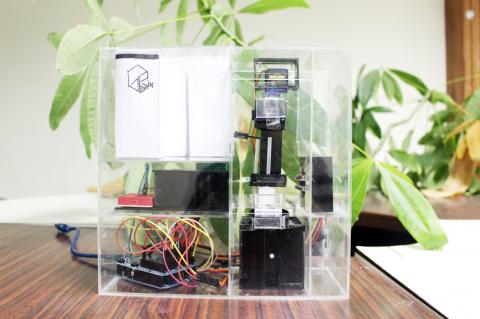A multidisciplinary team from Chiayi County’s National Chung Cheng University (CCU) won a silver medal for developing the Carindex — a device that detects tooth decay — at the International Genetically Engineered Machine (iGEM) Competition hosted by the Massachusetts Institute of Technology (MIT) last week.
The CCU Taiwan team was awarded a silver medal based on criteria that included validity, collaboration and human practices, according to iGEM’s Web site.
The judges also nominated the team — out of 310 participating teams — for a best entrepreneurship award.

Photo: Tseng Nai-chiang, Taipei Times
Elementary-school students in Taiwan visit the hospital every six months for an oral exam subsidized by the Ministry of Health and Welfare, but these six months can be a window for tooth decay, CCU team student leader Iris Chen (陳詩詠) said.
Inspired by this situation, 16 students from nine departments joined under the leadership of CCU Department of Biomedical Sciences associate professor Lee Cheng-i (李政怡) to develop an instrument to detect tooth decay at home, Chen said.
“Users of the Carindex dental caries-detecting device provide a saliva sample and wait for data to be generated from the interaction between their saliva and a special litmus paper. An hour and a half after the data are uploaded to the cloud, [users] can use a mobile app to find out their risk of developing cavities. Data from previous evaluations can be used to form a trend graph. [Carindex] can determine a risk level and remind users to go to the hospital for a checkup,” team member Eric Huang (黃裕軒) said.
The iGEM Competition is an international competition for students in the field of synthetic biology. The competition requires students to develop products that solve everyday problems.

WANG RELEASED: A police investigation showed that an organized crime group allegedly taught their clients how to pretend to be sick during medical exams Actor Darren Wang (王大陸) and 11 others were released on bail yesterday, after being questioned for allegedly dodging compulsory military service or forging documents to help others avoid serving. Wang, 33, was catapulted into stardom for his role in the coming-of-age film Our Times (我的少女時代). Lately, he has been focusing on developing his entertainment career in China. The New Taipei District Prosecutors’ Office last month began investigating an organized crime group that is allegedly helping men dodge compulsory military service using falsified documents. Police in New Taipei City Yonghe Precinct at the end of last month arrested the main suspect,

A cat named Mikan (蜜柑) has brought in revenue of more than NT$10 million (US$305,390) for the Kaohsiung MRT last year. Mikan, born on April 4, 2020, was a stray cat before being adopted by personnel of Kaohsiung MRT’s Ciaotou Sugar Refinery Station. Mikan was named after a Japanese term for mandarin orange due to his color and because he looks like an orange when curled up. He was named “station master” of Ciaotou Sugar Refinery Station in September 2020, and has since become famous. With Kaohsiung MRT’s branding, along with the release of a set of cultural and creative products, station master Mikan

LITTORAL REGIMENTS: The US Marine Corps is transitioning to an ‘island hopping’ strategy to counterattack Beijing’s area denial strategy The US Marine Corps (USMC) has introduced new anti-drone systems to bolster air defense in the Pacific island chain amid growing Chinese military influence in the region, The Telegraph reported on Sunday. The new Marine Air Defense Integrated System (MADIS) Mk 1 is being developed to counter “the growing menace of unmanned aerial systems,” it cited the Marine Corps as saying. China has constructed a powerful defense mechanism in the Pacific Ocean west of the first island chain by deploying weapons such as rockets, submarines and anti-ship missiles — which is part of its anti-access/area denial (A2/AD) strategy against adversaries — the

Eleven people, including actor Darren Wang (王大陸), were taken into custody today for questioning regarding the evasion of compulsory military service and document forgery, the New Taipei District Prosecutors’ Office said. Eight of the people, including Wang, are suspected of evading military service, while three are suspected of forging medical documents to assist them, the report said. They are all being questioned by police and would later be transferred to the prosecutors’ office for further investigation. Three men surnamed Lee (李), Chang (張) and Lin (林) are suspected of improperly assisting conscripts in changing their military classification from “stand-by